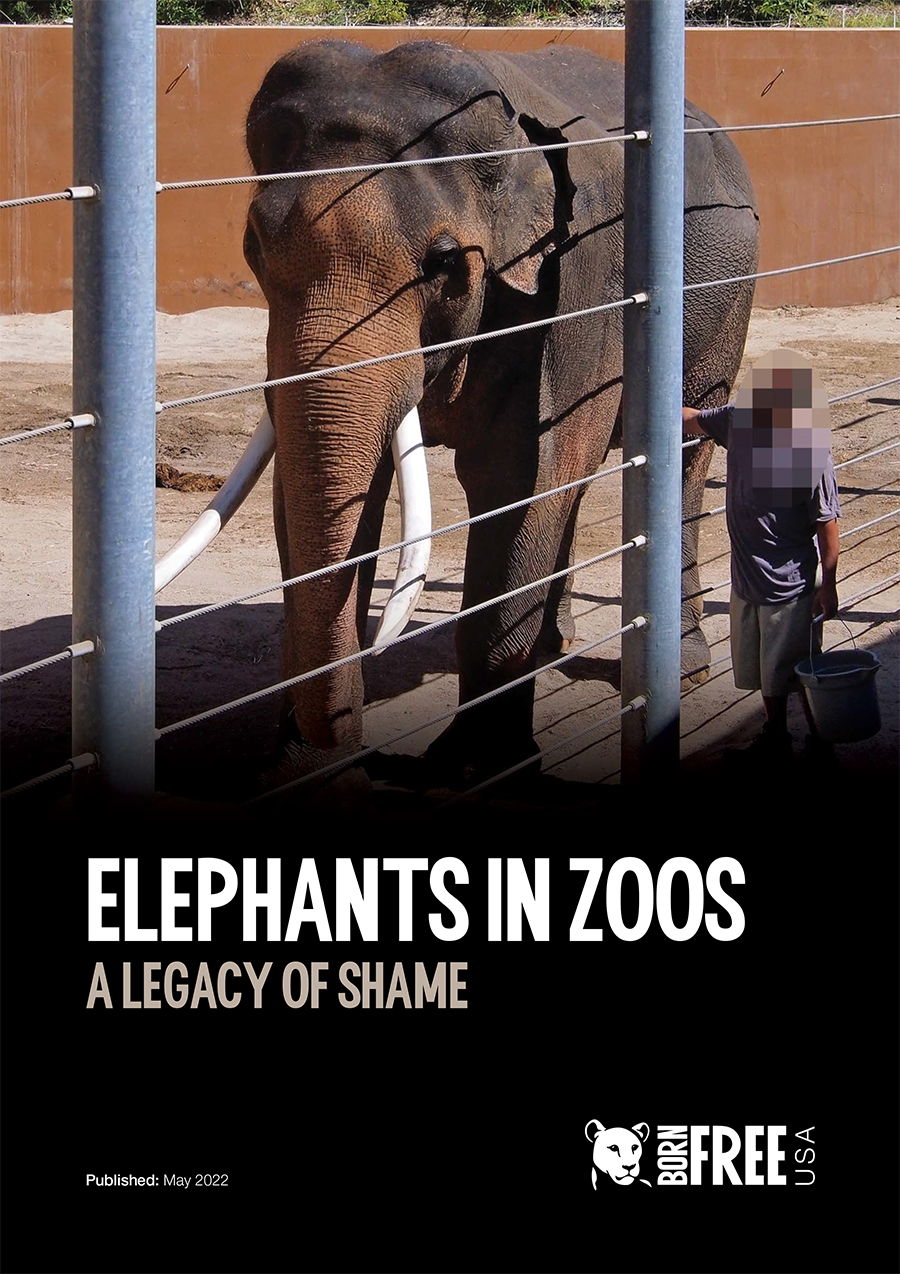Elephants in Zoos – A Legacy of Shame
Despite the large and growing volume of evidence highlighting the problems associated with keeping elephants in captivity, upwards of 1,000 elephants are housed in zoos around the world, most of whom suffer in captive conditions that cannot possibly mimic their wild habitats or provide them with the social and cultural opportunities or choices available to their wild counterparts. As a result, elephants in zoos typically suffer shortened life expectancies, as well as poor reproductive success, high calf mortality, a variety of physical problems, and a range of behavioral abnormalities.
Elephants in Zoos – A Legacy of Shame outlines the history and continuing plight of elephants in zoos across the United States, Canada, and Europe. Using specific individual cases, the report highlights the impacts of captivity on the physical and psychological health and welfare of individual elephants, the unsustainable nature of existing captive populations, and the impacts of wild capture for captive use on the social stability and conservation of wild elephant populations, with the consequent and serious knock-on effects on the wider ecosystems of which they are involved. The report also highlights the ethical and public safety concerns associated with keeping elephants in zoos.
We conclude that elephants do not belong in captivity and recommend that keeping of elephants in zoos should be phased-out. The capture of wild elephants for captive use and the breeding of elephants in zoos should be brought to an immediate end, and every effort should be made to ensure those elephants that must remain in captivity are provided with the best possible conditions to meet their welfare requirements and ensure their well-being for the remainder of their lives.
Download the Report
Sign the Petition!
Throughout the U.S., United States Department of Agriculture (USDA) licensees holding a Class C Exhibitor’s License are permitted to keep elephants in captivity for public exhibition. Exhibitors include zoos, carnivals, circuses, animal acts, and “educational” exhibits, both for and not for profit.
To obtain USDA licensing, all individuals or businesses must register under the Animal and Plant Health Inspection Service (APHIS) and adhere to the guidelines outlined by the Animal Welfare Act. There are no elephant-specific regulations in place to promote their mental or physical health, safety, or comfort at the most basic level.
Add your name to the petition to the USDA calling for the formation of a taskforce at the agency to explore how to address current welfare and conservation concerns relating to elephants in zoos, with a view to working towards the phase out elephant captivity in the U.S.
ADD YOUR NAME“Captive elephants are twice-trapped beings: caught at once within the physical and psychic confines that prevent us, their ‘keepers,’ from regarding and respecting who they truly are. Elephants are not spectacles. They are complex individuals with highly developed and impressionable psyches, and a lifelong devotion to family and social interaction that exactly mirror our own. Captivity, as this report clearly demonstrates, destroys all that for elephants. And all for the sake of some zoo cotton candy and few of our fleeting ‘Ooh’s’ and ‘Aha’s’.”
– Charles Siebert; essayist, journalist, poet, author, professor, and contributing writer to the New York Times Magazine, The New Yorker, Harper’s Magazine, and National Geographic, among other publications
“Across the U.S., elephants are languishing in zoos, where they are kept in conditions that can in no way mimic the richness of their natural environment. As Born Free USA’s report shows, elephant captivity does nothing to further species conservation in the wild – on the contrary, zoos require wild-caught elephants in order to retain their populations, thereby contributing to population decline. This is just one reason why I am so proud to represent the Detroit Zoo, who made the ethical decision nearly 20 years ago to close their elephant exhibit and transfer their elephants to a sanctuary. It is past time for other zoos to follow suit and begin the process of phasing out the keeping of elephants.”
– Congressman Andy Levin, (D-Michigan-09).
“This report confirms what anyone who has witnessed elephants in the wild already knows: To confine elephants is to condemn them to a life sentence. These are creatures who mirror humans in so many ways, from their emotional depth, to their intellect, to their very lifespan. They value family above all else and spend a lifetime nurturing their loved ones, traversing great distances and shaping ecosystems in the process. No zoo in the world can provide elephants with the complex social structures and vast spaces they need to thrive. The drastically reduced lifespans, low breeding rates, and poor mental health of elephants in captivity, as outlined in this report, are testament to that fact. Given how much we know about elephants, it is our moral responsibility to ensure no more are subjected to such purgatory — and to find solutions for those who are.”
– Angela Sheldrick, CEO, Sheldrick Wildlife Trust
Adopt an Elephant!
Your adoption gift will support Born Free USA's work to end the keeping of elephants in captivity and protect elephants from poaching, wildlife trade, and other threats. For only $1 a week or $5 a month, you can create a brighter future for these animals.
In addition to knowing you are protecting this species, you will receive an adoption package that includes an adoption certificate, a species information sheet, a photo of an elephant in the wild, and updates about our campaigns work. These adoptions also make great gifts!
CLCIK TO ADOPT
